Exploring the grim history of the Mauthausen Concentration Camp is a solemn experience that provides visitors with a visceral understanding of the horrors endured by its prisoners. This day trip from Vienna offers an immersive look into one of the largest and most brutal Nazi labor camp complexes, allowing participants to engage with the camp’s sobering legacy through a self-guided audio tour and visits to key landmarks. While the subject matter is undoubtedly harrowing, the tour promises to leave a lasting impact on those seeking to confront the realities of this dark chapter in history.
Key Points
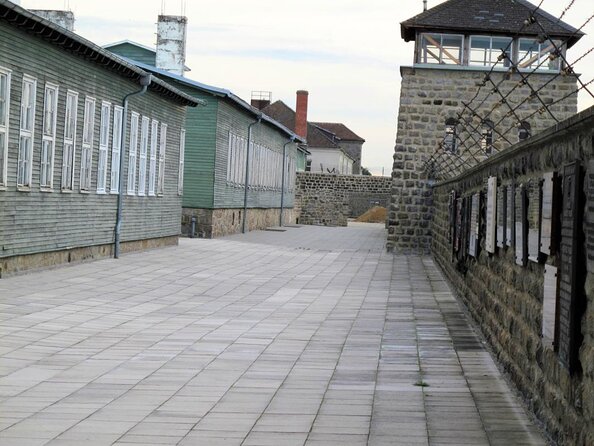
- Roundtrip transportation from a central meeting point in Vienna to the Mauthausen Memorial site, about an hour’s drive away.
- Self-guided audio tour in 11 languages covering key landmarks at the Mauthausen Memorial, including the Wiener-Graben quarry and the Stairs of Death.
- Opportunity to explore the prisoners’ barracks, SS quarters, gas chamber, and camp prison to gain a visceral understanding of the camp’s history.
- Visiting the infamous Stairs of Death, where prisoners were forced to carry heavy stones, provides a haunting reminder of the camp’s cruelty.
- Tour not recommended for children under 13, and cancellation is allowed up to 24 hours before the tour.
Overview of Mauthausen Concentration Camp
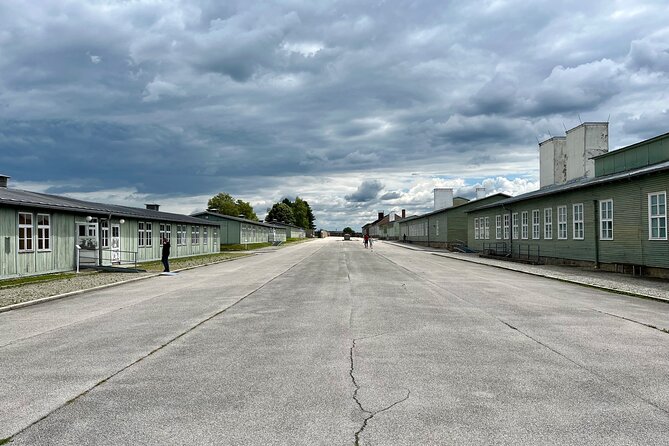
Mauthausen Concentration Camp was one of the largest and most brutal Nazi labor camp complexes in German-occupied Europe, operating from 1938 to 1945.
Located in Austria, the camp held around 200,000 prisoners over its seven-year history.
Mauthausen was notorious for its harsh living conditions, brutal treatment of inmates, and the notorious ‘Stairs of Death’ quarry where prisoners were forced to carry heavy stones.
It was the last camp to be liberated by Allied forces in 1945.
Today, the Mauthausen Memorial serves as a sobering reminder of the atrocities committed during the Holocaust, drawing visitors from around the world to honor the memory of those who suffered and perished within its walls.
Here are more great tours and experiences we've reviewed in Vienna
Tour Itinerary and Inclusions
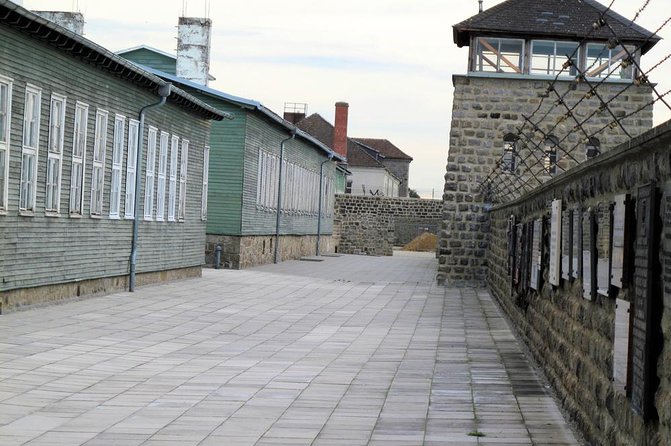
The day trip from Vienna to the Mauthausen Concentration Camp includes round-trip transportation and a self-guided audio tour covering the memorial site’s key landmarks, such as the Wiener-Graben quarry, prisoners’ barracks, and the infamous ‘Stairs of Death‘.
Visitors can explore the SS quarters, gas chamber, and camp prison at their own pace, with audio guides available in 11 languages.
The tour doesn’t recommend children under 13 years old. Food and drinks aren’t included, and hotel pickup and drop-off are also excluded.
The meeting point is at the Tourist-Info Wien in central Vienna, and the tour lasts around 3 hours at the memorial site, with free cancellation up to 24 hours before the scheduled departure.
Transportation and Meeting Point
The tour includes roundtrip transportation from a central meeting point in Vienna, making it convenient for visitors to access the Mauthausen Concentration Camp memorial site.
Participants meet at the Tourist-Info Wien, located in the heart of the city, before embarking on the journey to the camp.
From there, the tour group boards a comfortable coach that takes them directly to the Mauthausen Memorial site, which is about an hour’s drive from Vienna.
This transportation arrangement eliminates the need for visitors to organize their own travel, allowing them to focus on the sobering experience of exploring the former concentration camp.
Upon completing the tour, the coach returns the group to the original meeting point in central Vienna.
Self-Guided Audio Tour Experience
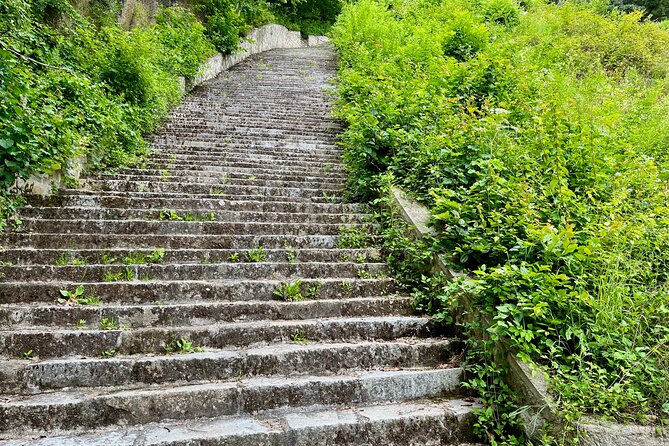
Once visitors arrive at the Mauthausen Memorial, they can embark on a self-guided audio tour to explore the camp’s harrowing history at their own pace.
The audio guides, available in 11 languages, provide detailed information and commentary as participants navigate the former prisoners’ barracks, the chilling Wiener-Graben quarry, the notorious ‘Stairs of Death‘, the SS quarters, the gas chamber, and the camp prison.
This immersive experience allows guests to engage with the somber and sobering legacy of Mauthausen, gaining a deeper understanding of the atrocities committed within its walls.
The self-guided format also gives visitors the flexibility to spend as much or as little time as they need at each significant site, ensuring a meaningful and impactful tour.
Visiting the Wiener-Graben Quarry
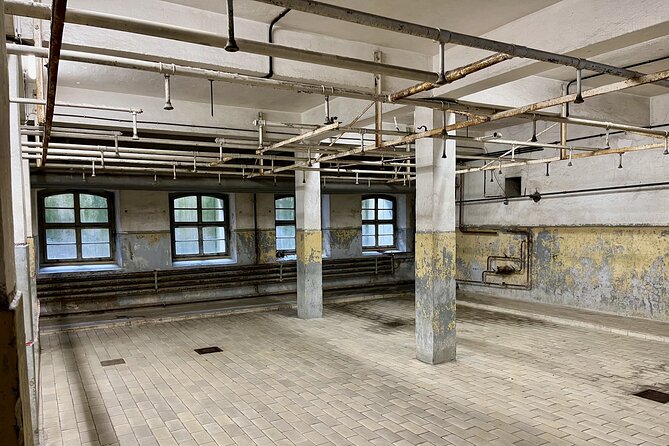
After exploring the prisoners’ barracks and SS quarters, visitors can head to the harrowing Wiener-Graben quarry, where inmates were forced to perform grueling labor under deplorable conditions.
The quarry, located within the camp grounds, was the site of backbreaking work, with prisoners carrying granite blocks weighing up to 50 kilograms up the infamous ‘Stairs of Death.’
These 186 steps were deliberately constructed to be treacherous, causing countless prisoners to slip and fall to their deaths.
The quarry and stairs serve as a grim reminder of the inhumane treatment and immense suffering endured by those imprisoned at Mauthausen. Traversing this area provides a visceral connection to the horrors of the past.
- Vienna Classical Concert at St. Peter’s Church
- Highlights of Vienna City Center Walking Tour
- Time Travel-Magic Vienna History Tour Ticket
- Vienna: Skip the Line Schönbrunn Palace and Gardens Guided Tour
- Concert in St. Annes Church Vienna: Mozart, Beethoven, Haydn and Schubert
- Wachau Valley Wine Tasting Bike Tour From Vienna
Exploring the Prisoners’ Barracks
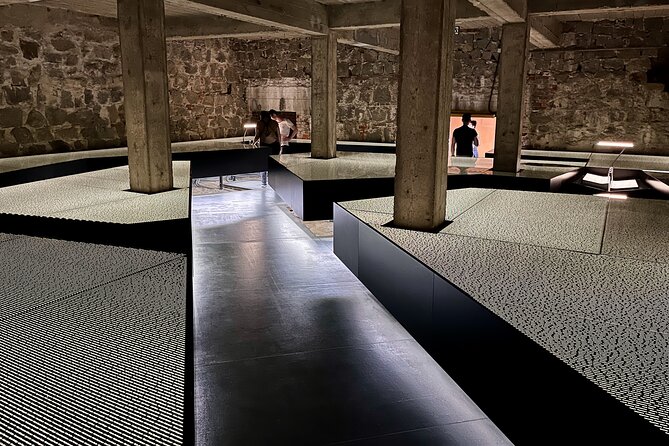
Visitors can explore the prisoners’ barracks, where inmates were forced to live in cramped and squalid conditions during their internment at Mauthausen. These barracks, which held up to 1,000 prisoners each, provide a stark reminder of the dehumanizing treatment experienced by those incarcerated within the camp.
The barracks offer a glimpse into the daily lives of prisoners, who:
- Slept on wooden bunks with little to no bedding
- Endured severe overcrowding and lack of sanitation
- Were subjected to brutal beatings and arbitrary punishment
- Had no privacy or personal space, living under constant guard
These haunting remnants of the camp’s atrocities stand as a somber testament to the horrors of the Holocaust.
Significance of the Stairs of Death
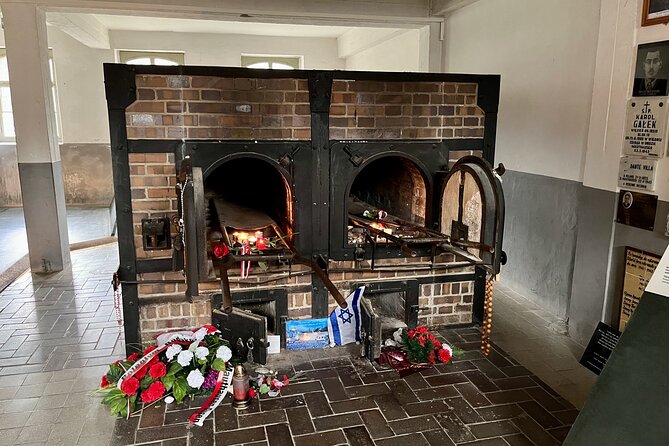
The Stairs of Death at Mauthausen Concentration Camp symbolize the immense cruelty and brutality inflicted upon the prisoners.
This 186-step granite staircase, which prisoners were often forced to climb while carrying heavy loads, became infamous for the many inmates who perished from exhaustion or were pushed to their deaths by their SS guards.
Prisoners viewed the Stairs of Death as a symbol of the camp’s inhumane and dehumanizing treatment, where even basic survival was a constant struggle.
The sheer difficulty of climbing the steep steps, combined with the guards’ callous disregard for human life, made this location a harrowing testament to the horrors of the Nazi concentration camp system.
Visitor Information and Cancellation Policy
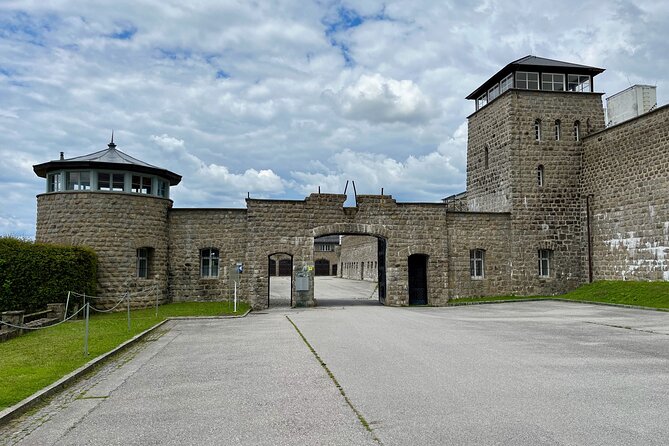
The tour starts at 8:30 AM from the Tourist-Info Wien in central Vienna, with the group returning to the same meeting point after approximately 3 hours spent at the Mauthausen Memorial site.
The roundtrip transportation from Vienna is included, along with admission to the memorial and museum, as well as a self-guided audio tour in 11 languages.
Visitors should note that the tour isn’t recommended for children under 13.
Cancellation is free up to 24 hours before the tour.
Key details:
- Roundtrip transportation from Vienna
- Self-guided audio tour in 11 languages
- Access to Mauthausen Memorial and Museum
- Cancellation allowed up to 24 hours prior
Frequently Asked Questions
Can I Take Photos Throughout the Memorial Site?
Yes, visitors can take photos throughout the Mauthausen memorial site. However, they should be respectful and avoid capturing images that may be seen as insensitive or disrespectful to the site’s solemn history and the victims.
What Is the Approximate Walking Distance During the Tour?
The tour covers a moderate walking distance, with visitors exploring key sites like the Wiener-Graben quarry and Stairs of Death. The total walking time is approximately 1-2 hours, depending on visitors’ pace and interest in each memorial area.
Are Restrooms Available at the Memorial Site?
Yes, there are restrooms available at the Mauthausen Memorial site. Visitors can access the restroom facilities during their self-guided tour of the camp and memorial areas.
Is There a Place to Store Luggage During the Tour?
There is no dedicated luggage storage at the Mauthausen Memorial site. Visitors are advised to minimize personal belongings and carry only essentials during the tour. Large bags or suitcases may not be permitted on the premises.
Can I Bring My Own Audio Guide or Do I Have to Use the Provided One?
You can bring your own audio guide, but the tour includes a self-guided audio tour in 11 languages. Using the provided audio guide is recommended to fully experience the tour’s content and commentary about the Mauthausen memorial sites.
Recap
Mauthausen Concentration Camp’s day trip from Vienna offers a sobering yet immersive experience, allowing visitors to engage with the camp’s dark history.
The self-guided audio tour, access to key landmarks, and the chance to gain a visceral understanding of the prisoners’ suffering make this an impactful and educational excursion.
Though difficult, this trip serves as a powerful reminder of the inhumanity that occurred at Mauthausen and the importance of remembering such tragic events.
More 1-Day Tours in Vienna
- Vienna: Hallstat, Salzburg, Melk Abbey, & Dürnstein Day Trip
- Private day trip from Munich to Neuschwanstein Castle
- From Vienna: private day trip to Hallstatt and Salzburg
- Private all day trip from Munich to Nuremberg and back
- From Vienna: Hallstatt, Mountains & Alpine Lakes Day Trip
- Christmas all day trip from Budapest to Vienna & back
More Tour Reviews in Vienna
Not for you? Here's more things to do in Vienna we have recnetly reviewed
- Vienna: City Highlights Guided Bike Tour
- Wroclaw: Vienna Opera Gala
- Vienna: Dinner & Concert at Schönbrunn Palace
- Vienna: Luxury Vintage Fashion Walking Tour
- Vienna: Christkindlmarket Guided Walking Tour
- Kahlenberg Vienna: Forest Rope Park Entry Ticket & Equipment
- Vienna: 2 Hours Sightseeing Walking Tour
- Culinary evening at the Gerstner K. u. K. Hofzuckerbäcker
- Vienna: Hallstatt & Alpine Peaks Day Trip with Admont Abbey
- Vienna: Heidi Horten Collection Museum Entry Ticket
- Vienna: Private World War II Walking Tour
- RAXI (Electric Rickshaw) Vienna Tours with two options
